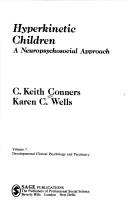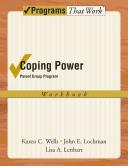| Listing 1 - 5 of 5 |
Sort by
|

ISBN: 0803922795 Year: 1986 Publisher: Beverly Hills (Calif.) : Sage,
Abstract | Keywords | Export | Availability | Bookmark
 Loading...
Loading...Choose an application
- Reference Manager
- EndNote
- RefWorks (Direct export to RefWorks)

ISBN: 0803922787 Year: 1986 Publisher: Beverly Hills Sage
Abstract | Keywords | Export | Availability | Bookmark
 Loading...
Loading...Choose an application
- Reference Manager
- EndNote
- RefWorks (Direct export to RefWorks)
Book
ISBN: 019024206X 1281529192 9786611529192 0198043880 9780198043881 0190296291 Year: 2008 Publisher: Oxford ; New York : Oxford University Press,
Abstract | Keywords | Export | Availability | Bookmark
 Loading...
Loading...Choose an application
- Reference Manager
- EndNote
- RefWorks (Direct export to RefWorks)
The Coping Power Program is designed for use with preadolescent and early adolescent aggressive children and their parents and is often delivered near the time of children's transition to middle school. Aggression is one of the most stable problem behaviors in childhood. If not dealt with effectively, it can lead to negative outcomes in adolescence such as drug and alcohol use, truancy and dropout, delinquency, and violence. This program has proven effective in helping to avoid these types of problems. The parent component of the program consists of 16 group meetings also held during the 5th a
Aggressiveness in children. --- Conduct disorders in children. --- Acting-out (Child psychiatry) --- Antisocial personality disorders in children --- CD (Child psychiatry) --- Child conduct disorders --- Disturbance of conduct (Child psychiatry) --- Misconduct (Child psychiatry) --- Behavior disorders in children --- Aggressiveness (Child psychology) --- Aggressiveness (Psychology) in children --- Child psychology --- Conduct disorders in children
Book
ISBN: 0190242078 1281342173 9786611342173 0198043899 9780198043898 9781281342171 9780195327885 0195327888 9780195327878 019532787X 0190450002 Year: 2008 Publisher: Oxford ; New York : Oxford University Press,
Abstract | Keywords | Export | Availability | Bookmark
 Loading...
Loading...Choose an application
- Reference Manager
- EndNote
- RefWorks (Direct export to RefWorks)
The Coping Power Program is designed for use with preadolescent and early adolescent aggressive children and their parents and is often delivered near the time of children's transition to middle school. Aggression is one of the most stable problem behaviors in childhood. If not dealt with effectively, it can lead to negative outcomes in adolescence such as drug and alcohol use, truancy and dropout, delinquency, and violence. This program has proven effective in helping to avoid these types of problems. The parent component of the program consists of 16 group meetings also held during the 5th a
Aggressiveness in children. --- Conduct disorders in children. --- Aggressiveness in children --- Conduct disorders in children --- Behavioral Symptoms --- Family Relations --- Age Groups --- Behavior --- Socioenvironmental Therapy --- Social Behavior --- Persons --- Psychotherapy --- Family --- Behavior and Behavior Mechanisms --- Psychology, Social --- Named Groups --- Psychiatry and Psychology --- Behavioral Disciplines and Activities --- Psychotherapy, Group --- Parent-Child Relations --- Aggression --- Child --- Medicine --- Social Sciences --- Health & Biological Sciences --- Psychology --- Pediatrics --- Behavior And Behavior Mechanism --- Behavioral Symptom --- Symptom, Behavioral --- Symptoms, Behavioral --- Children --- Minors --- Aggressions --- Parent Child Relationship --- Parent-Child Relationship --- Parent-Offspring Interaction --- Interaction, Parent-Offspring --- Parent Child Relations --- Parent Child Relationships --- Parent Offspring Interaction --- Parent-Child Relation --- Parent-Child Relationships --- Parent-Offspring Interactions --- Relation, Parent-Child --- Relationship, Parent Child --- Relationship, Parent-Child --- Group Psychotherapy --- Therapy, Group --- Group Therapy --- Psychology, Perceptual --- Social Psychology --- Perceptual Psychology --- Extended Family --- Family Life Cycle --- Family Research --- Filiation --- Kinship Networks --- Relatives --- Family Life Cycles --- Family Members --- Family, Reconstituted --- Stepfamily --- Extended Families --- Families --- Families, Extended --- Families, Reconstituted --- Family Member --- Family, Extended --- Kinship Network --- Life Cycle, Family --- Life Cycles, Family --- Network, Kinship --- Networks, Kinship --- Reconstituted Families --- Reconstituted Family --- Research, Family --- Stepfamilies --- Grandparents --- Psychotherapies --- Neurolinguistic Programming --- Sensory Art Therapies --- Person --- Sociality --- Behavior, Social --- Behaviors, Social --- Social Behaviors --- Therapy, Socioenvironmental --- Socioenvironmental Therapies --- Therapies, Socioenvironmental --- Acceptance Process --- Acceptance Processes --- Behaviors --- Process, Acceptance --- Processes, Acceptance --- Age Group --- Group, Age --- Groups, Age --- Family Dynamics --- Family Relationships --- Family Relationship --- Dynamic, Family --- Dynamics, Family --- Family Dynamic --- Family Relation --- Relation, Family --- Relations, Family --- Relationship, Family --- Relationships, Family --- Acting-out (Child psychiatry) --- Antisocial personality disorders in children --- CD (Child psychiatry) --- Child conduct disorders --- Disturbance of conduct (Child psychiatry) --- Misconduct (Child psychiatry) --- Behavior disorders in children --- Aggressiveness (Child psychology) --- Aggressiveness (Psychology) in children --- Child psychology --- therapy

ISBN: 0190275405 1281342181 9786611342180 0198043910 9780198043911 9781281342188 9780195327960 0195327969 9780190275402 6611342184 Year: 2008 Publisher: Oxford ; New York : Oxford University Press,
Abstract | Keywords | Export | Availability | Bookmark
 Loading...
Loading...Choose an application
- Reference Manager
- EndNote
- RefWorks (Direct export to RefWorks)
The Coping Power Program is designed for use with preadolescent and early adolescent aggressive children and their parents and is often delivered near the time of children's transition to middle school. Aggression is one of the most stable problem behaviors in childhood. If not dealt with effectively, it can lead to negative outcomes in adolescence such as drug and alcohol use, truancy and dropout, delinquency, and violence. This program has proven effective in helping to avoid these types of problems. The parent component of the program consists of 16 group meetings also held during the 5th a
Aggressiveness in children. --- Conduct disorders in children. --- Parenting. --- Parent and child. --- Child and parent --- Children and parents --- Parent-child relations --- Parents and children --- Children and adults --- Interpersonal relations --- Parental alienation syndrome --- Sandwich generation --- Parent behavior --- Parental behavior in humans --- Child rearing --- Parent and child --- Parenthood --- Acting-out (Child psychiatry) --- Antisocial personality disorders in children --- CD (Child psychiatry) --- Child conduct disorders --- Disturbance of conduct (Child psychiatry) --- Misconduct (Child psychiatry) --- Behavior disorders in children --- Aggressiveness (Child psychology) --- Aggressiveness (Psychology) in children --- Child psychology --- Conduct disorders in children
| Listing 1 - 5 of 5 |
Sort by
|

 Search
Search Feedback
Feedback About UniCat
About UniCat  Help
Help News
News